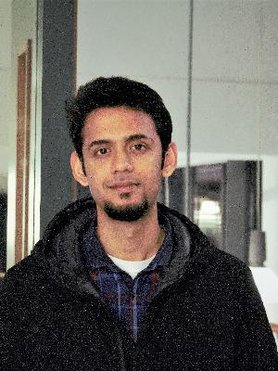

Ir. K. (Kushal) Ujjaini Kempaiah
Ir. K. (Kushal) Ujjaini Kempaiah
Profile
Science Communication
I enjoy making science content centered around Fluid Mechanics on YouTube through my channel
2BrokeScientists.
Webpages
NIFTI
The PhD research undertaken is funded by
LaVision GmbH as a part of the
Clean Sky 2 project titled “Non-Intrusive Flow distortion measurements within a Turbofan Intake” (NIFTI). The project will work towards facilitating the development and implementation of new methodology for testing of high bypass ratio turbofan engines employing non-intrusive measurement technique like Particle Image Velocimetry (PIV).
The recent developments in propulsion system for aircrafts has moved towards high bypass ratios and larger fan diameters where a short and slim intake design is necessary to compensate for the additional aerodynamic drag and weight penalties of the increased diameter (Smith 2013). The short intakes cause high levels of unsteady total pressure and velocity distortions especially under crosswind or angle of attack operations during take-off (Guimaraes et al 2019). Such distortions are expected to adversely affect the engine’s performance, operability, structural integrity, and safety margin with potentially catastrophic consequences for the entire propulsion system. With current practices of aero-engine testing and safety certification relying primarily on intrusive methods (Guimaraes et al 2019), it is imperative that a non-intrusive technique like PIV is applied. This is even more critical as the industry is moving towards an era of novel, closely integrated architectures whereby the various sub-systems (i.e. the engine, intake, nacelle, pylon and fuselage) are developed as an overall system. Consequently, the necessity for richer data to aid the understanding of flow distortions that lead to engine stall becomes critical. To aid and facilitate the development of new methodology, a project under the EU Clean Sky 2 initiative called Non-Intrusive Flow distortion measurements within a Turbofan Intake (NIFTI) which includes many partners will design, and execute the experiments.
Flow Control
A clear contributor to fuel consumption is the aerodynamic drag that aircrafts experience. At cruise velocities, the skin-friction drag makes up roughly 50% of the airplane’s total drag (Roggenkamp et al 2015). The drag experienced by the aircraft can be reduced by either designing wings that promote laminar flow (Joslin 1998) or try and reduce the turbulent skin-friction drag (Gad-el-Hak 1996).
The PhD work will focus on turbulent skin-friction reduction. Of the many techniques developed for turbulent skin-friction reduction, spanwise wall oscillations has received much attention, given the large potential to achieve a significant skin-friction reduction (up to 45%, Quadrio and Ricco 2004). The complete understanding of the physical mechanism of drag reduction is yet to be obtained. The lack of a consensus in the reduction mechanism stems from a more fundamental question pertaining to the near wall mechanism of wall bounded turbulent flows. Further analysis of spanwise wall oscillation possesses the potential to understand the mechanism further and push the boundaries of literature.
The PhD research is planned to employ active techniques like spanwise wall oscillations (mechanical actuation), plasma actuators and move towards answering the question “Are passive and active techniques for turbulent skin-friction drag reduction feasible or will their applicability be limited to a laboratory environment?”.
Introduction
The area of my PhD research focuses on utilizing Particle Image Velocimetry (PIV) for aerospace applications. I am currently working on two research topics which are
- Non-Intrusive Flow distortion measurements within a Turbofan Intake (NIFTI)
- Active flow control for reducing turbulent skin-friction drag.
Expertise
Publications
-
2024
High-resolution turbofan intake flow characterization by automated stereoscopic-PIV in an industrial wind tunnel environment
Kushal U. Kempaiah / Tommaso Piovesan / Pavlos K. Zachos / Dirk Michaelis / Roy Gebbink / Bart van Rooijen / Daniel Gil Prieto / David MacManus / Andrea Sciacchitano / Christopher Sheaf
-
2023
Active control of turbulent skin-friction
An experimental study
K. Ujjaini Kempaiah -
2022
Feature-based analysis of a turbulent boundary layer under spanwise wall oscillation
Kushal U. Kempaiah / Fulvio Scarano
-
2022
Large-scale flow organization of wall-bounded turbulence over flush-mounted rotating discs
Kushal U. Kempaiah / Jacopo Sem / Woutijn J. Baars
-
2022
PIV analysis of skin friction and coherent structures in turbulent drag reduction regimes
F. Scarano / K. Ujjaini Kempaiah / M. Kotsonis
-